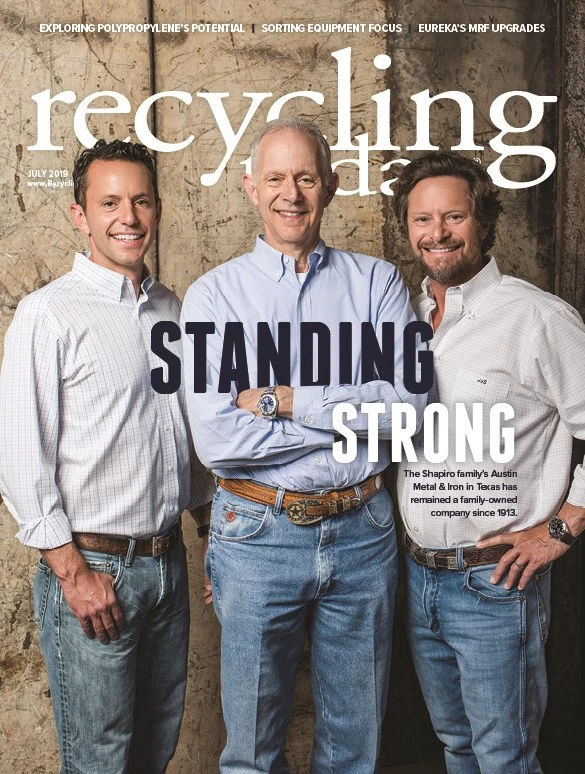Taiwanese firm buys Phoenix Technologies International
Taiwan-based Far Eastern New Century Corp. (FENC) has announced the acquisition of Phoenix Technologies International LLC, Bowling Green, Ohio. Phoenix, which is a recycler of polyethylene terephthalate (PET), can process 36,000 tons annually.
Phoenix is the third production site FENC has acquired in the U.S. over the last 18 months. Last year, FENC also acquired a plant in West Virginia, a research and development center in Ohio and obtained approval to invest in a plant in Texas.
This acquisition will help meet FENC’s downstream global beverage brand and consumer product clients’ sustainable development goals and solidifies synergies with its subsidiary in West Virginia.
FENC says it is the world’s second largest recycling producer and the third largest PET resin supplier.
Malaysia returns tons of plastic scrap to exporting countries
Malaysia will send back 3,000 tons of “contaminated” plastic scrap to exporting countries, including the United States, United Kingdom, Canada and China. The announcement was made by Malaysian Energy, Science, Technology, Environment and Climate Change Minister Yeo Bee Yin during a press conference in late May.
The country will return 450 tons of plastic scrap from 10 containers “immediately” and the remaining 50 containers, which were “illegally” imported, will be shipped back to the place of origin once they are fully inspected, Yin said. “The laborious and costly inspection process was necessary to identify containers and [their] exporting country.”
Port Klang, Malaysia, has inspected 123 containers originating in the U.S., U.K., Japan, China, Spain, Canada, Saudi Arabia, Norway and France. The ongoing investigation uncovered a U.K.-based recycling firm that has exported more than 50,000 tons of plastic scrap in 1,000 containers to Malaysia over the past two years. Yin said the government is compiling and will release a list of recycling companies in different countries that are “dumping” scrap in Malaysia.
She said shippers are declaring that the containers contain recyclable plastic; however, inspections have revealed household waste and electronic scrap in the containers.
“What the citizens of the U.K. believe they send for recycling is actually being dumped in our country,” Yin said. “Now we know that garbage is traded under the pretext of recycling.”
Yin called the Malaysian companies that are illegally importing to the country “traitors to the country’s sustainability.”
She added, “Malaysians and [people in] other developing countries have a right to clean air, clean water, sustainable resources and a clean environment to live in just like citizens of developed nations. That is why we urge the developed countries to also review their management of plastic [scrap] and stop shipping garbage out to the developing countries. If they are shipped to Malaysia, we will return it back without mercy.”
ELV project recovers plastics from automobiles
The results of the final two phases of the end-of-life vehicle (ELV) recycling demonstration project have been released by the Plastics Industry Association (Plastics), Washington. The ELV project demonstrated that recovering thermoplastic polyolefin (TPO) from ELV bumpers is feasible, the association says in a news release.
Launched in 2015, the ELV project was designed to study the viability of collecting and recycling plastic car parts, including car bumpers, to eventually be broken down and used as materials to make new products.
“Finding innovative ways to recycle and reuse plastics has a direct impact on the amount of plastic that ends up in landfills,” says Plastics Interim President and CEO Patty Long. “By developing lasting, sustainable end markets for these materials, even those extracted from scrap cars and trucks, Plastics is giving scrap materials a new life through recycling.”
Over the course of the three phases of research for the ELV project, four plastic bales from four different sources were processed by three plastics recyclers across the United States, and each bale sample met the range of quality that would make it eligible for use in a wide range of applications. From these findings, Plastics was able to create a directory of automotive recyclers that specialize in using ELV materials.
Following phases two and three, Plastics says it will share case studies from the ELV project. There is a vested interest from brand owners in using recycled ELV bumpers in their manufacturing and design process, the association says.
“The results from the ELV project indicate that there is technology and a market to recycle plastic from vehicles,” says Kendra Martin, Plastics vice president of industry affairs. “Organizations have been able to make new parts from car bumpers.”
ACI Plastics, Automotive Recyclers Association (ARA), Boston Auto Wreckers, Canadian Plastics Industry Association (CPIA), Erema North America, Geo-Tech Polymers and Padnos are among the member organizations involved in the ELV project.
Meagan Marko, product line manager at Grand Rapids, Michigan-based Noble Polymers, recently spoke at Plastics’ Re|focus summit about commitments to using innovative materials within automotive manufacturing.
“The properties of the material were very close to what we would see from a recycler,” she said. “We saw a lot of promise in the material and we think if the collection and the stream can be scaled up, then there will be a lot of use for it in the market.”

Explore the July 2019 Issue
Check out more from this issue and find your next story to read.
Latest from Recycling Today
- NWRA announces 2025 Driver of the Year, Operator of the Year winners
- The Scrap Show: Nanci Schuld of FE Trading Group LLC
- Call2Recycle Canada partners with RLG to advance battery collection
- Report delves into recovery opportunities for food-grade polypropylene
- Reimagining Supplier Payments in Metal Recycling: A Digital Leap Forward
- STEINERT Lithium Battery Detection and Removal from Waste Streams
- Driving the Future: Innovations in Waste & Recycling Technology
- Robin Wiener recognized for recycling leadership





